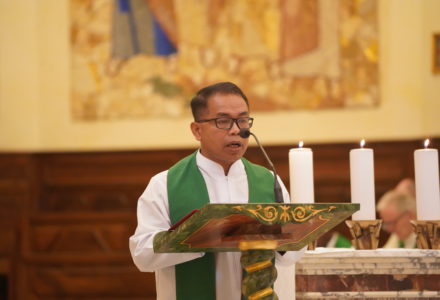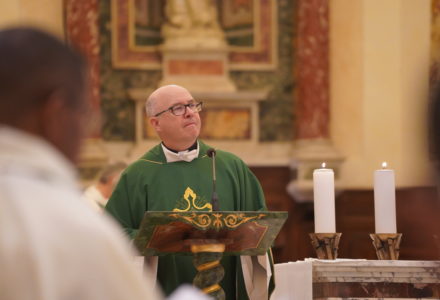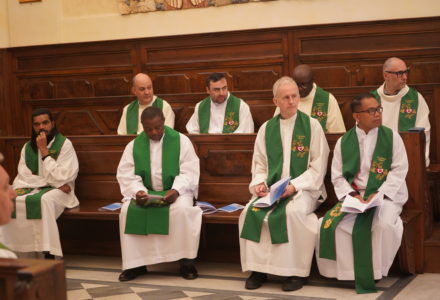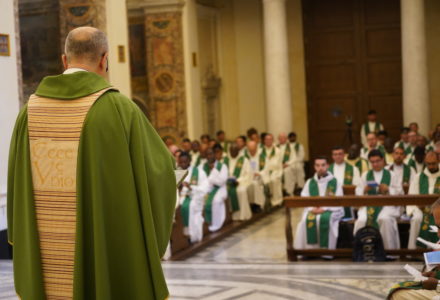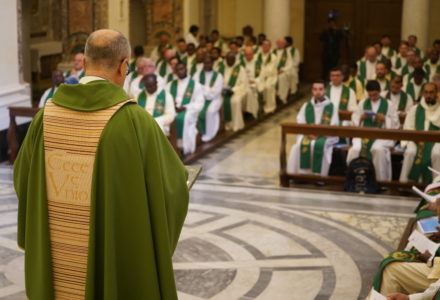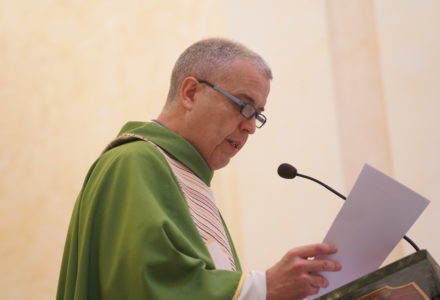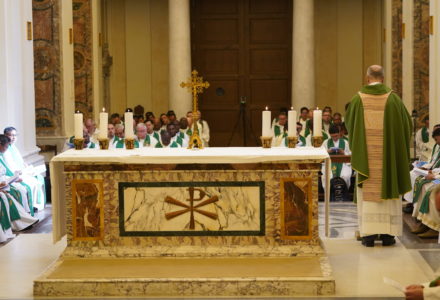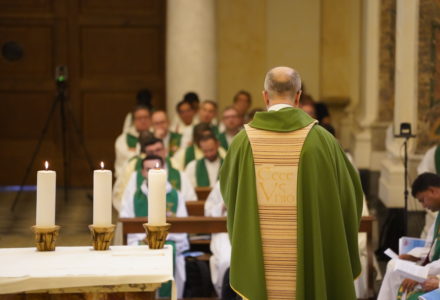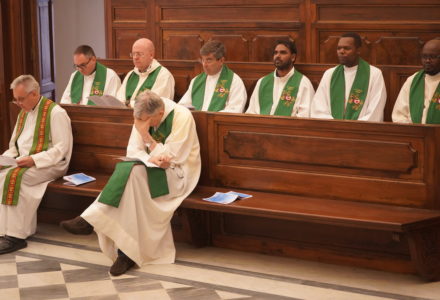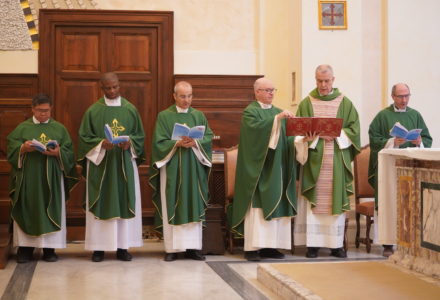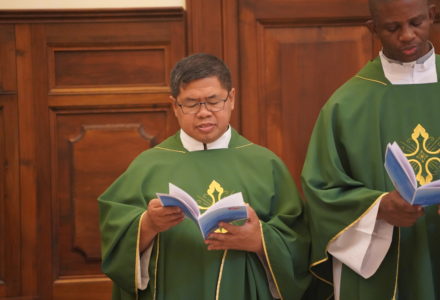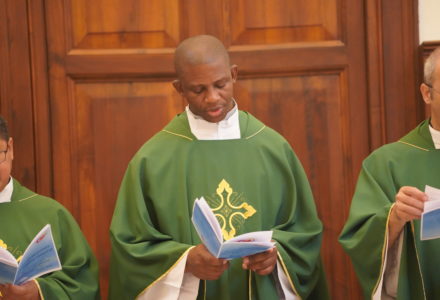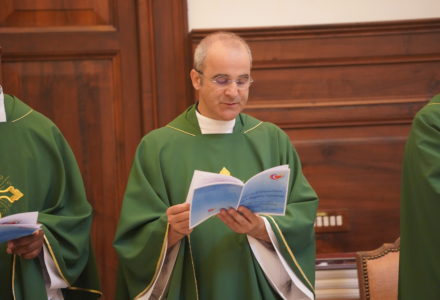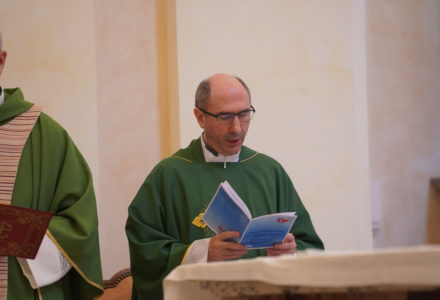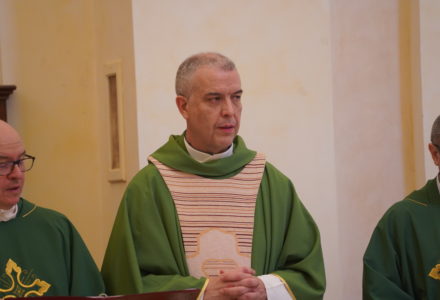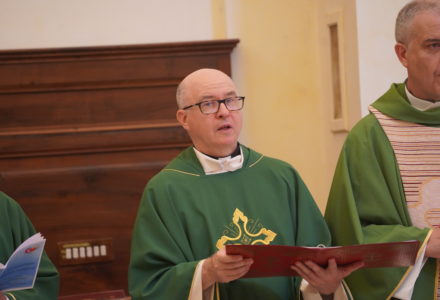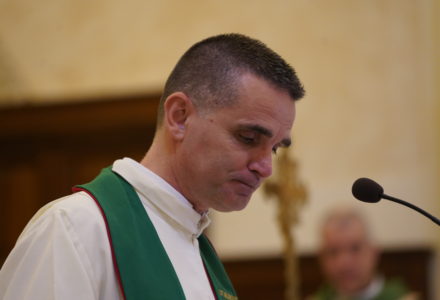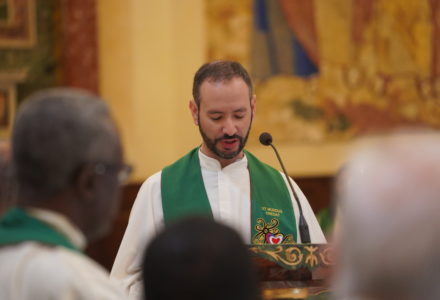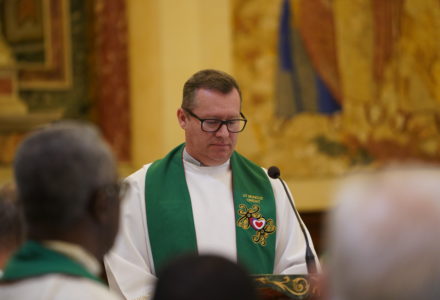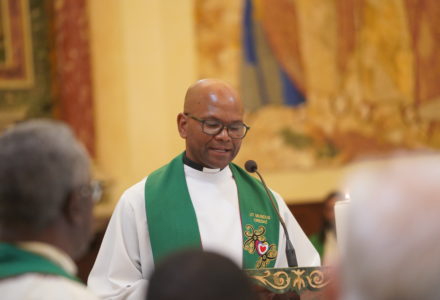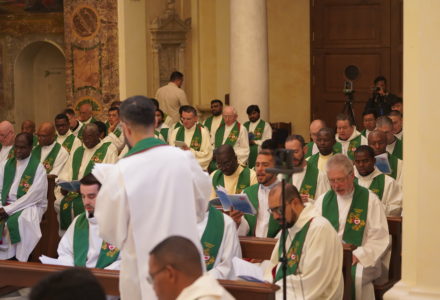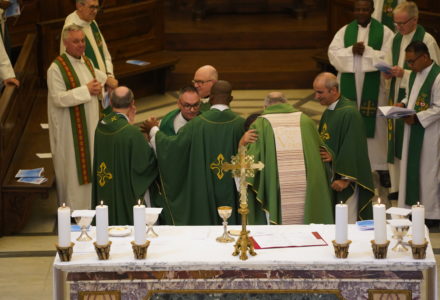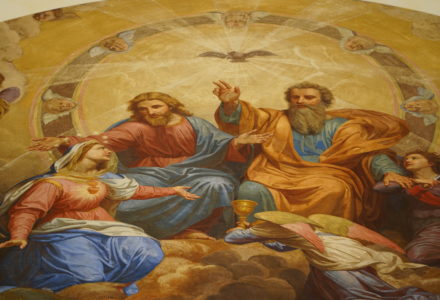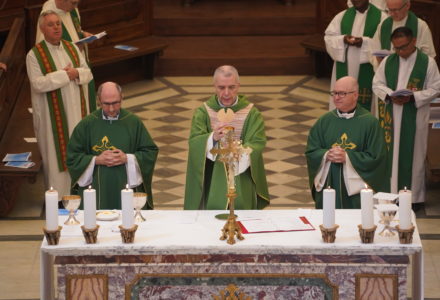Opening Mass of the general chapter
At the Pontifical French Seminary of St. Clare, where Fr. Dehon stayed, the opening mass of the general chapter was celebrated. We report the homily of the Superior General.
In the second letter that the seminarian Leo Dehon wrote to his parents in November 1865, less than a month after arriving at this Seminary of Santa Chiara, he told them:
I told you about my move in my last letter: it’s now complete. This peaceful, orderly, yet active life is just what I needed. I’m happy and happy to be preparing myself through study and prayer to render some service to the Church. Don’t think I’m telling you this to satisfy you: it’s from the depths of my heart. God has called me here to give me happiness.
Dear brothers and friends, it is exciting to celebrate this Sunday’s Eucharist at the Pontifical French Seminary of Santa Chiara, which has so kindly opened its doors to us, on the day we begin the XXV General Chapter of the Congregation.
In the fragment of the letter that I have just read to you, Fr. Dehon told his family that the Lord had called him to Rome, to this seminary, to “grant him happiness”, to “make him glad”. Without intending it, that young Dehon, still far from his doctorate in theology, through such a familiar letter, gives us the key to God’s call: “that we may be happy”.
Here, in this place where we are, the seminarian Dehon began a new stage of his Christian journey. He could hardly have imagined then how God would interact with him over the years.
II.
Today’s Word of God, in a certain way, speaks to us of interaction. As I read it in preparation for this homily, two stories came to mind. They are from different times and contexts. The first one is the Creation story, the one that occupies the first pages of the Scriptures. Why think about it?
In today’s readings as a whole, there are many words used in the first pages of the Bible, among others: day, night, earth, fruits, trees, plants, birds and also man. Of him it is said:
- who works, watches and sleeps
- that one day he will be asked “what have you done?”
- that he must understand nature and its rhythms
- that he does not know everything
- who knows God’s remoteness and his exile
- that he longs for God and is able to trust in him
We know that creation meant the end of the dominion of chaos and darkness. It was not in vain that the breath of God hovered over both. In the scene presented by Ezekiel, God rises above the tallest tree and mountain, and intervenes on them: he cuts, plants, moves, humbles, elevates, dries, and finally makes them flourish. God himself says that certain trees needed to learn. They are the trees “of the field” (Ez 17:24).
Presented in this way, they seem to be associated with the serpent of Genesis, the most cunning of the animals “of the field”. Just as it happened to her, everything suggests that the big tree, and others with it, were trying to occupy God’s space. With its tall canopy, the tree points and reaches toward an insatiable higher, as if it were the “tree of Babel”, the wooden version of an impossible tower of bricks. But God’s intervention eventually transformed the landscape, repaired it. The arrogance of the arrogant tree was displaced by the offering of the new tree, capable of bearing fruit and offering its spreading branches as a home and shelter for others.
III.
The second story that accompanies the reflection of the Word is from a text that the Church gave us ten years after the foundation of our Institute. We know it as the Decretum Laudis.
“Among the brambles and thorns that grow everywhere in our century, in the city of St. Quentin, diocese of Soissons, in the year 1878, the pious Society called the Priests of the Most Sacred Heart of Our Lord Jesus Christ of Soissons, whose purpose is to ensure that its members (alumni), renouncing earthly affections, abandon themselves in everything to the Divine Heart and strive to kindle both in themselves and in their neighbor that fire that Our Lord has come to bring to earth. What else does he want but for it to flare up!”
We know the history behind this text and how much it meant for the later development of the Congregation. The little seed that God planted in the heart of our Founder flourished: in him, in the lives of other religious, in new places and in different works. The Church showed her appreciation for all this. Dehon often proclaimed how God was good to him and how tenderly he was guided by God in the midst of all that he lived and all that happened, even in spite of his own mistakes. Nothing made him lose hope and trust in the Lord.
The words of the Apostle Paul that we heard today are also valid for the life of our Founder: “We walk by faith, not by sight. Yet we are courageous” (2 Cor 5:7-8). St. Paul nourished his faith and hope by learning and sharing with the communities what Jesus did and said, including in parables like the ones we have heard today.
They are parables that speak to us of God’s desire to give life, not just in any way, but by involving all of creation in it. God the Father, whom Jesus reveals to us, is not satisfied with exclusivity or competitive protagonism. What he seeks is collaboration, from the beginning of time. He wants collaborators who, like the earth, know how to welcome and wait, as Mary did. Collaborators who learn to accompany processes and to respect times, even without understanding well what is happening, as it happened to Peter with Jesus, merciful seed of the Father. Collaborators capable of being attentive and accepting to be disciples, but without falling into voluntarism or rigorism.
IV.
The tall tree and the small seed underwent transformations so that they themselves might have new life and make the best of themselves available for the life of others. This is the dynamic of the Kingdom of Heaven, which humanizes and makes history fruitful. Others are more noisy, but sterile. They are the dynamics of the “of the field”, to use the expression of today’s Word. They abound in our world, disguised as progress and contagious happiness, but they lead us away from the genuine freedom of the children of God and from the happiness that is born in the acceptance of the Beatitudes.
How free our beloved seminarian felt in this house! Even in the simplicity of his own room:
My room is modest, but very clean and healthy. It’s high and well-ventilated, facing the sunset. I have a bed, a table, two chairs, a wardrobe and a coat rack.
Since then, that small seed, also cultivated in the simplicity of his room, has grown. We are part of the fruit that God planted in Dehon’s heart. We have grown, certainly in the eyes of people. I do not know if we have grown as much as the cedars of Lebanon, but certainly more than the trees that surround us in our Roman Generalate. But we will have the opportunity to share about that and many other things in the coming days.
In any case, may God’s holy breath hover over the trees and our home in these days. May it hover over each one of us, helping us to understand, as Jesus did with his disciples, explaining his word to them. Perhaps it is our Constitutions themselves where the Spirit comes to our aid. There he leaves us a beautiful Dehonian exegesis of what, in my opinion, is the synthesis of today’s Word:
In following Him, we must live in real solidarity with all.
Sensitive to what obstructs the love of the Lord in to ay’s world, we are witnesses to the fact that human effort constantly needs to be purified and transfigured by the cross and resurrection of Christ to arrives at the fullness of the Kingdom (Cst 29).



